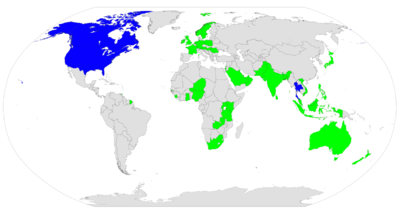SOWPODS
You are viewing a condensed mobile version of this NASPA webpage.
Switch to full version.
(This page has been revised with contributions from Nick Ball.)
The SOWPODS lexicon, more commonly now referred to as Collins or Collins Scrabble Words (CSW), is a word list published in 2007 by Collins and used in most countries as the SCRABBLE® lexicon. In January 2010, the NASPA Advisory Board authorized the creation of a separate SOWPODS rating system for NASPA-sanctioned games played using the SOWPODS lexicon.
This map shows countries according to the lexicon(s) they use. Currently, 45 countries use CSW (green), and 4 use predominantly TWL, with some CSW play (blue: Canada, Israel, Thailand, and the United States).
The name “SOWPODS” was coined as an anagram of "OSW OSPD", the names of the two lexicons (Official Scrabble Words and the Official SCRABBLE Players Dictionary) that were originally merged to form SOWPODS. The SOWPODS word list is currently edited by the WESPA Dictionary Committee; comments concerning the list should be directed to the International Committee. The SOWPODS word list contains all words found in OTCWL, as well as a large number of other English words from around the world.
The purpose of these webpages is to provide informative and, hopefully, interesting information to those North American tournament and club players who are curious about trying out the CSW game. They do not, therefore, aim to introduce Scrabble play as a whole, but those parts of it that change if one plays CSW. Thus, we start with how the game differs from OTCWL, introduce the most useful extra words to know, address some commonly asked questions and concerns, then describe the current CSW scene as it is evolving in North America.
The sections below are in order, but each can be read on its own.
- How is the game different?
- How many more words are there, and what would I need to learn?
- Are all the words obscure, obsolete, foreign, etc.?
- How often is the list updated?
- What are the downsides?
- CSW Tournaments
- CSW ratings
- CSW links
- Try it!
Comments concerning this page may be directed to Nick Ball.
